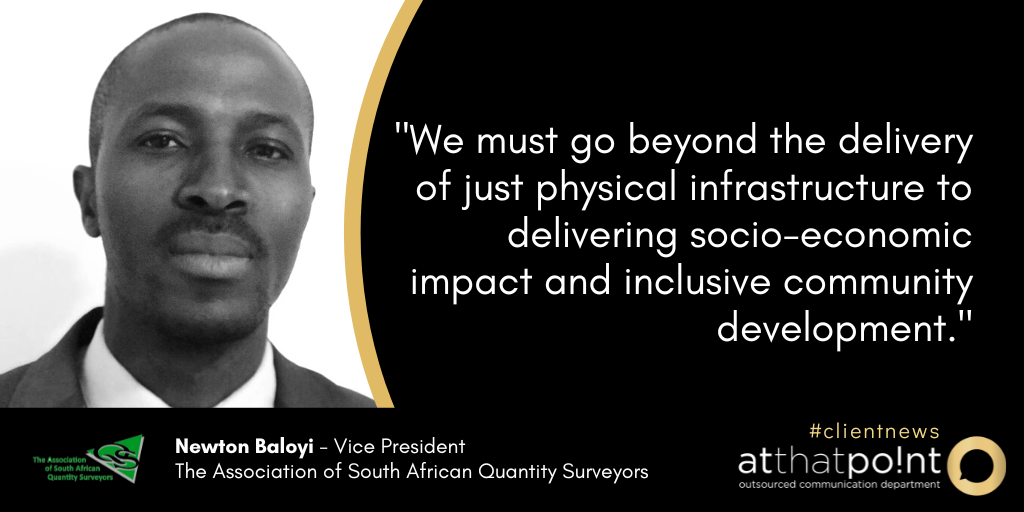|
“Infrastructure development is a catalyst for economic development but is often accompanied by strikes from communities, business forums and criminal activities by construction mafias. At the centre of this instability is the demand for meaningful participation by communities in the labour and business opportunities inherent in infrastructure projects,” said Newton Baloyi, Vice President of the Association of South African Quantity Surveyors (ASAQS) at the recent Western Cape Property Development Forum Conference held in Cape Town.
While the ASAQS welcomes the announcement of the establishment of the Broad-Based Black Economic Empowerment Advisory Council by President Cyril Ramaphosa, it however notes with concern that the panel seems not to have any representation from the built environment professions or construction sector procurement, despite the critical nature of infrastructure to South Africa’s economic recovery and development, and the high levels of instability and community disruptions on infrastructure projects. B-BBEE in the construction sector has specific unique challenges that need urgent attention. “The missing link is that our infrastructure procurement regulatory framework does not go far enough in addressing the socio-economic concerns of communities,” Baloyi said. “We need other mechanisms for measuring the performance of infrastructure projects. We must go beyond the delivery of just physical infrastructure to delivering socio-economic impact and inclusive community development.” Baloyi told the conference and supported his statement by sharing the findings of a pilot project he conducted. The pilot was based on a project set aside for the community. The findings showed that the benefit of the project to the community could be increased from 6 cents to 40 cents per Rand spent on the project and the payback period reduced from 17 years to 2.5 years. This meant that the benefit to the community could exceed the client’s procurement spent in just over 2.5 years. In addition, the social return on investment (SROI) would be improved from a negative 94% to a positive 60%. According to Baloyi, there are four interventions required to achieve these kinds of results for the construction sector. Firstly, a mindset shift to integrate impact measurement into construction projects. Secondly, integrate impact delivery into infrastructure procurement practices and legislation. Thirdly, establishing sector community capacity development programmes that enable meaningful community participation in projects rather than the current project-by-project approach. Lastly, proactive establishment of community buy-in based on the shared impact objectives of projects. “These four interventions must be coordinated and integrated into projects; having one without the other does not work,” Baloyi warned. The failure to integrate the four interventions is where B-BBEE fails communities and the construction sector. “Communities expect participation with or without capacity, otherwise there will be strikes,” said Baloyi “Yet, there are no sustainable capacity building programmes for community businesses and skills. The financial support needed by local businesses can hardly be accessed within the life of a project.” “These are systemic challenges that cannot be solved by social facilitators on construction projects, nor by a developer or contractor on a project-by-project basis. These challenges play a significant role in project delays, poor service delivery, budget overruns and delayed economic development. We hope that the B-BBEE advisory council will go a long way in addressing the fragmented approach to B-BBEE and foster the integration proposed herein.” “Given the high levels of poverty, inequality and especially youth unemployment and the negative economic outlook of South Africa, urgent interventions are required to avert intensified and violent strikes in the construction sector. Low hanging fruits include the establishment of an initiative led by the construction sector that integrates all stakeholders in the built environment to establish a voluntary pilot that can inspire hope in communities and reassure them that their concerns are being addressed.” “Rather than theorising about transformation, let’s do it in real-time and with real results as the built environment,” Baloyi told the conference as he called on developers, built environment professionals and contractors to amalgamate their skills development, supplier and enterprise development and SED/CSI resources to establish such a pilot linked to their portfolio of projects. He suggested that it is time for the built environment professionals to lead the transformation agenda in the construction sector. “We are the experts in infrastructure procurement and strategies and not government”. ENDS MEDIA CONTACT: Stephné du Toit, [email protected], 084 587 9933, www.atthatpoint.co.za For more information on ASAQS please visit: Website: www.asaqs.co.za LinkedIn: linkedin.com/company/asaqs Twitter: @the_ASAQS Facebook: facebook.com/asaqsza
0 Comments
|
Archives
July 2024
Categories
All
|


 RSS Feed
RSS Feed